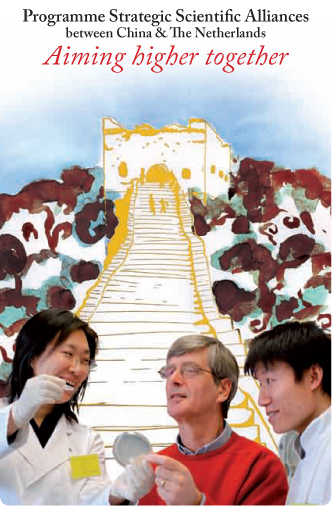About PSA
Since 2005 the Schuit Institute of Catalysis and the Dalian Institute of Chemical Physics have been conducting a highly ambitious research program in the field of Novel catalytic materials for chemicals and renewable energy. The research is conducted in the framework of the Programme Strategic Scientific Alliances between China and the Netherlands funded by the Royal Netherlands Academy of Sciences and Arts and the Chinese Ministry Of Science and Technology. This program brings together scientists from the Chinese and Netherlands sides in a long-term effort to progress in catalytic science. Many novel and improved catalytic materials have already been identified with applications in a wide variety of chemical processes through the intensive joint efforts of this international research team.
Catalysis has become the heart of our modern chemical industry. It ensures more efficient use of finite natural resources, it helps prevent waste and air pollution, and it provides a perspective to a more sustainable society based on renewable generation of energy and chemicals.
Prof. Dr. Ir. E.J.M. Hensen
PSA Facts and Figures
- The Programme Strategic Scientific Alliances between China and the Netherlands , known as PSA, was initiated by the Dutch Ministry of Education, Culture and Science (OCW) and is managed by the Royal Netherlands Academy of Arts and Sciences.
- PSA was set up at the request of OCW (1997-1999) and in consultation with the Chinese counterpart organisations: the Chinese Ministry of Science and Technology (MOST), the Chinese Ministry of Education (MOE), the Chinese Academy of Sciences (CAS) and the National Natural Science Foundation of China (NSFC).
- MOST is responsible for implementing and financing PSA for China.
- PSA focuses on fundamental and strategic research in three priority areas: materials research, biotechnology and environmental research.
- What is unique about PSA is the “funnel” model: the number of partnerships decreases in each phase, but those that do continue increase in size and intensity because the programme’s total annual budget remains the same.
- The PSA’s project phase commenced in 2004 for a three-year period. Fifteen projects were selected at the start. Six of the selected fifteen projects will continue for another five-year period in the PSA’s programme phase. Finally, in the strategic alliance phase, two or three strategic alliances will once more continue for another five years.
- The Netherlands is contributing an annual sum of EUR 1,360,000 to PSA’s budget. In China, MOST is contributing an equivalent sum of RMB 10,000,000 per year.
- In PSA’s first phase, the six projects that continued produced a total of more than 170 publications that were either submitted for publication or were published, averaging almost 30 publications per project over a three year period!
